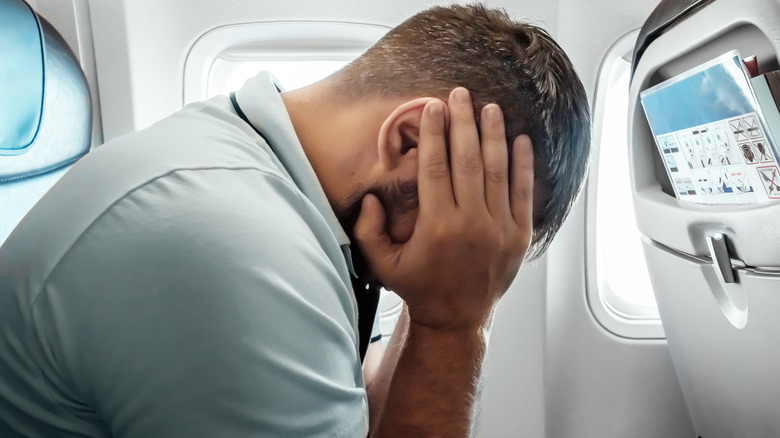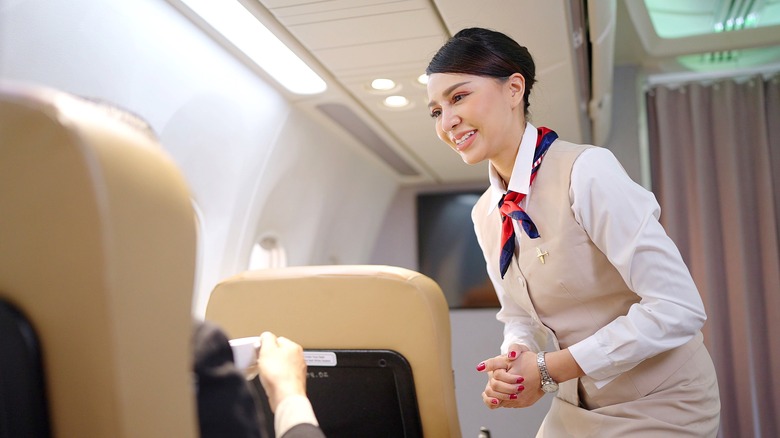The Best Things You Can Do If You Have Food Poisoning On The Day Of Your Flight
While there is never a good time to get food poisoning, it is twice as bad when you're traveling. An airplane seat is the last place you want to be when your tummy is turning. Is there anything you can do to make it less miserable, other than hightailing it off the plane?
"Airplanes are funny places because things that would be so easy to fix on the ground are more difficult to fix in the air due to a lack of resources and people to fix it," Dr. Daniel Chandler, primary care physician at Tufts Medical Center, told Huffington Post. Chandler suggested bringing medicine with you just in case, especially if you are traveling to a country with high risks of traveler's diarrhea, like India, Kenya, and Thailand. You may also want to think about skipping on-board food, especially if you know the unsettling details about the safety of it.
There is nothing good about enduring food poisoning while aboard a plane. But one thing that is key to making your trip more tolerable is being open to communicating your needs. Particularly if you're confined to any seat but the aisle, it's an uncomfortable situation to ask other people to move or hope they switch seats with you. You should also consider sitting in this section if you're worried about motion sickness. By voicing your concerns to those around you, including the flight attendants, you can help make the situation a little more bearable.
Talk to the flight attendants
Whenever you're on a plane, flight attendants have your back. And if you're feeling sick and woozy from food poisoning, you need to let them know. That's the best way to ensure they can advocate for you if you need it. That's how Elizabeth Preske got through her flight home after contracting food poisoning in Mexico. Her flight attendants were so helpful during her ordeal.
"Anytime [the flight attendants] walked past my seat, they asked me how I felt. When I started getting chills, they gave me a blanket to keep me warm. They even offered to find out if there was a doctor on board," she wrote of the experience, via Yahoo. "Even though there wasn't much the flight attendants could do while we were 30,000 feet up in the air, they were able to give me priority access to the bathroom — and that was truly the key to surviving the flight incident-free."
Another way flight attendants can support you is by bringing you extra water. Your cabin crew will be there for you, so don't forget to use the call button if you need to.
Try and stay hydrated
When battling food poisoning, keeping yourself hydrated is one of the best ways to feel better. You'll especially want to replace important electrolytes like sodium and potassium that your body might be missing after being sick. Since you're on an airplane, hydrating is even more important since the air in the cabin can dry you out. According to the Cleveland Clinic, a plane can be dehydrating because of low humidity in the air, which also affects your skin.
Before boarding, it's a good idea to get ahold of some enhanced beverages to replace those electrolytes. Dr. Cindy Chung of Kaiser San Rafael Pediatrics told National Geographic to be sure these beverages aren't too sugary. "Too much sugar makes you feel worse when you have vomiting and diarrhea," she told the outlet. She also suggested drinking Pedialyte or a low-sugar Gatorade.
Other beverages you can enjoy to help rehydrate you include broths and watered-down juices. But you should try to avoid alcohol and caffeine, which can cause symptoms to be worse. To help settle your stomach on board, you could also order this tasty, fizzy beverage known to help tummy issues thanks to its infusion of ginger.


